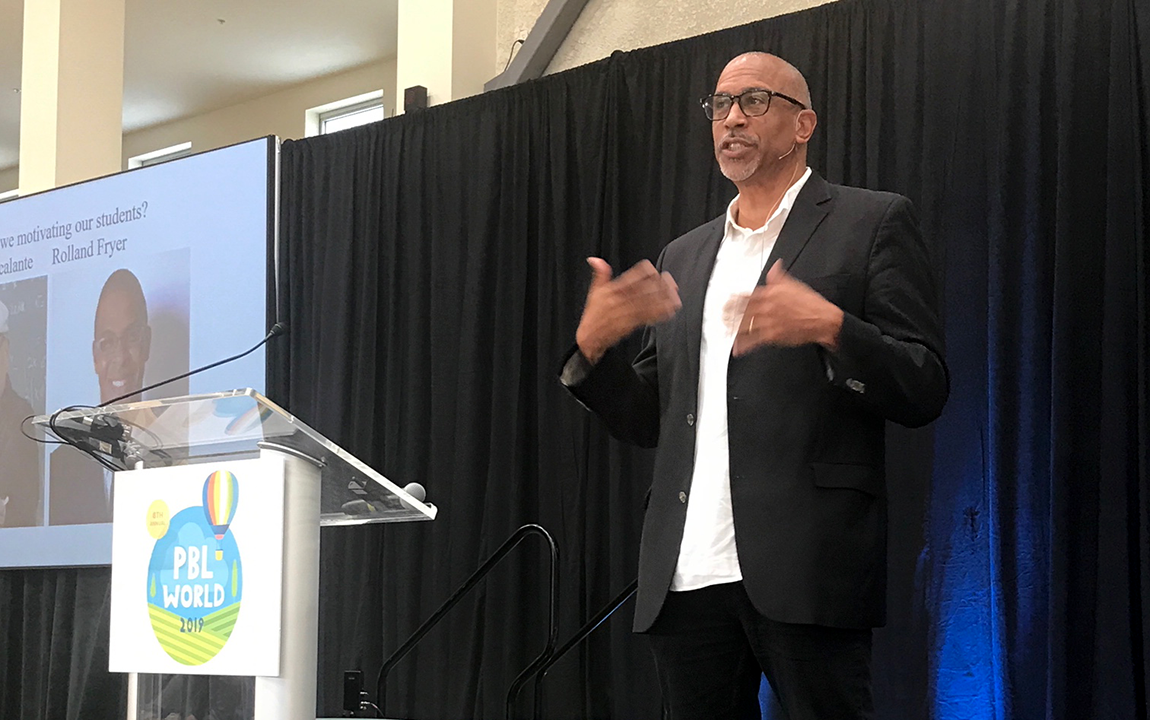
Dr. Pedro Noguera, Distinguished Professor of Education at the Graduate School of Education and Information Studies at UCLA, challenged all teachers to put equity at the center of their work in a powerful keynote to kick off day 2 of PBL World.
“Equity is not only for schools serving low-income kids of color,”
he told the audience of 1,400 educators from 13 countries. In schools serving affluent communities, “we have students with special needs, who aren’t getting it, who are stressed out or depressed. Equity issues show up everywhere.”
Noguera, the author of a dozen books, is a widely respected expert on how schools are influenced by social and economic conditions, as well as by demographic trends. Instead of focusing on data, however, he opened with stories from his own experiences as a learner and young teacher.
Noguera got shout-outs from around the packed room when he asked who else was the first in their family to attend college. Neither of his parents graduated high school, yet he and his five siblings all went to elite universities.
At age 21, Noguera launched his teaching career. He was determined not to race through content, but to make history come alive for sixth graders.
“If you don’t make learning fun for middle schoolers, they will make it fun at your expense,”
he said, drawing knowing laughs from the crowd.
His message turned more serious when he described the danger of fixating on test scores as the only measure of school success. In the rush to raise achievement, he said, “we forgot how to get there. We have to use education to get children excited about learning.”
PBL World participants, who include teachers and school leaders in a wide range of roles, heard validation for the hard work they are doing to design projects that will engage learners and unleash their curiosity. “Children are naturally curious. That can be a driver for achievement,” Noguera said.
Projects that emphasize critical thinking prepare students to be engaged citizens. “How can they vote intelligently if they can’t think critically? Can they tell the difference between fake news and real news?” The ability to ask hard questions, to analyze evidence, to apply what they have learned are all outcomes of high-quality PBL, which Noguera described as deeper learning.
By connecting academically rich projects to students’ lives, schools can help prevent the disengagement that leads to limited life opportunities. Currently, some 5 million young adults in the U.S. are neither working nor in school. “That’s a lot of wasted talent,” Noguera said.
Keeping students engaged in learning also means meeting the needs of each learner. For teachers, that means asking, “Who’s getting it? Who’s not? How do we make learning visible so we can differentiate support?” Students also need help developing the success skills that they will take into life, “learning how to work together, deferring gratification, dealing with conflict,” he said.
As another strategy to close the equity gap, Noguera encouraged educators to “recognize that the academic and social needs of a child are connected.” A teenager who is routinely late might be spending the morning getting younger brothers and sisters ready for school. “They’re late because they’re being responsible,” he said. “Can we change the schedule instead of setting them up to fail?”
In planning projects, teachers need to recognize “that some students will need more time, support, or stronger relationships—and it’s our job as adults to build those relationships.”
For all his enthusiasm for PBL, Noguera cautioned participants not to see this instructional approach as a panacea. Teachers need time and collaboration with their peers to get familiar with new ways of teaching and learning. Without that support, he warned, “they will go back to traditional ways because that’s all they know—even if it’s not working.
The biggest obstacle to improving schools is the isolation of our teachers.”
Fortunately, PBL World participants are getting the time, space, mentoring, and peer support they need to bring projects to life with all their students.

